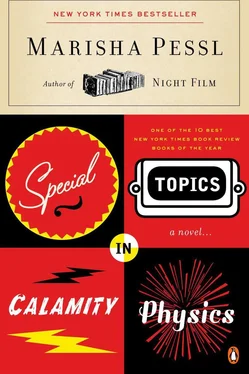Dad had only written one relatively short piece about The Nightwatchmen, published in 1998, “ Nächtlich : Popular Myths of Freedom Fighting.” Every now and then, too, for his Civil War seminars, he included on reading lists a more extensive commentary about their methodologies, an essay out of Herbert Littleton’s Anatomy of Materialism (1990), “The Nightwatchmen and Mythical Principles of Practical Change.” With little trouble, I located both on the bookshelf (Dad always purchased five copies of any Federal Forum issue in which he was featured, not unlike a paparazzi-hungry starlet when her picture graces “Around Town” in Celebrastory Weekly ).
I returned to Dad’s desk with the two publications. To the left of his laptop sat a hefty stack of legal pads and various folded foreign newspapers. Curious, I paged through them, my eyes having to adjust to decode his barbed-wire handwriting. Unfortunately, their subject matter had nothing to do with The Nightwatchmen or the whereabouts of George Gracey (thus paralleling Smoke’s story like a dream). Instead, they featured Dad’s obvious cause célèbre, civil upheaval in the Democratic Republic of the Congo and other nations of Central Africa. “When Will Killing Stop?” demanded the awkwardly translated editorials in Afrikaan News , the small Cape Town political newspaper. “Where Is Champion for Freedom?”
I put those papers aside (returning them to their original order; Dad knew snooping the way dogs smell fear) and began my orderly investigation into The Nightwatchmen (or “ Mai addormentato ,” as they were called in Italian and apparently  in Japanese). First, I read Dad’s Federal Forum article. Second, I browsed the long-winded Chapter 19 in the Littleton book. Lastly, I turned on Dad’s laptop and searched for the group on the Internet.
in Japanese). First, I read Dad’s Federal Forum article. Second, I browsed the long-winded Chapter 19 in the Littleton book. Lastly, I turned on Dad’s laptop and searched for the group on the Internet.
In the years since 1998, the number of pages referencing the radicals had mushroomed; the 100,000 had become 500,000. I scanned as much as I could, no resource excluded for bias, romanticism or even conjecture (“Within prejudice grows all kinds of remarkable truths,” Dad said): encyclopedias, history texts, political Web sites, Leftist blogs, Communist and Neo-Marxist sites (a favorite, www.thehairyman.com — alluding to Karl Marx’s lionlike appearance), conspiracy and anarchist Web sites, sites about cartels, cults, hero worship, urban legends, organized crime, Orwell, Malcolm X, Erin Brockovich and something out of Nicaragua called Champions of Che. It seemed the group was like Greta Garbo when she first went into retirement: mysterious, impossible to pin down and everyone wanted a piece of her.
It took me a little over an hour to look through everything.
When I finished, my eyes were red, my throat dry. I felt drained and yet — scandalously alive (pronounced “a-LIVE”), giddy as the bright green Darning Needle Dragonfly that careened into Dad’s hair at Lake Pennebaker, making him dance like a marionette, go “Ahhhhh!” and barge through a crowd of geriatrics wearing yellow visors identical to the yellow halo Christ sports in old frescoes.
My heart-thumping excitement was not simply because I knew so much about The Nightwatchmen I felt oddly confident I could deliver a Dadified lecture on them, my voice a tidal wave, rising up, up over the shabbily combed heads of his students, and not because, rather incredibly, Ada Harvey’s information had held up heroically upon further examination like the British blockade against the Germans in the First Battle of the Atlantic during World War I. My exhilaration wasn’t even because Hannah Schneider — all that she’d done, her strange behaviors, her lies — had suddenly come crashing open at my feet like the outer stone sarcophagus of Pharaoh Heteraah-mes when Carlson Quay Meade, in 1927, fumbled his way through a murky mummy cache high up in the cliffs of the Valley of the Kings. (For the first time, I could crouch down, take my oil lantern directly to Hannah’s bone-smooth face, see, in startling detail, its every angle and plane.)
It was something else, too, something Dad once said after recounting those final hours in the life of Che Guevara. “There is something intoxicating about the dream of liberty and those who risked their lives for it — particularly in this whiny day and age, when people can barely manage to roll off their Barcalounger to answer a doorbell for a pizza delivery, much less a cry for freedom.”
I’d solved it.
I couldn’t believe it. I’d recovered the values of both x and y (with the vital assistance of Ada Harvey; I wasn’t vain like many applied mathematicians, desperate to appear unaccompanied in the Annals of History). And I felt both terror and awe — what Einstein experienced in the middle of the night in 1905 in Bern, Switzerland, after waking from a nightmare in which he’d witnessed two pulsing stars crashing together creating strange waves in space — a vision that would inspire his General Theory of Relativity.
“It vas ze sceriest end most beautiful sing I haf ever seen,” he said.
I hurried over to Dad’s bookshelf again, this time pulling Colonel Helig’s treatise on murder from the shelf, Machinations Idyllic and Unseen (1889). I paged through it (so old, pages 1–22 dandruffed out of the spine), searching for the passages that would cast the last puddles of light on this sprawling truth I’d uncovered, this surprising — and obviously, treacherous — New World.
The oddest insight into the workings of The Nightwatchmen (an incident Dad would deem evidence of “a legend’s potential to be worn like a trench coat, used for good, warding off the rain, and evil, streaking through a park, frightening children”) was an episode detailed on www.goodrebels.net/nw, in which two eighth graders from an affluent Houston suburb committed suicide together on January 14, 1995. One of them, a thirteen-year-old girl, had written a suicide note — posted on the Web site — and in stark handwriting, on frighteningly sweet stationery (pink, rainbows) she’d written: “We hereby eliminate our selfs in the name of The Nightwatch Men and to show our parents their money is dirty. Death to all oil pigs.”
The creator of the site (when you clicked on “About Randy” he revealed himself to be an emaciated woolly-mammoth type with a serious red mouth zipped tightly into his face, of indeterminate age) complained about this, the “heritage” of The Nightwatchmen being abused in such a fashion, because “nowhere in their manifestos do they say kill yourself because you’re rich. They’re champions against capitalist abuses, not wacko members of the Manson Family.” “Death to all pigs,” of course, was written in blood on the front door of Cielo Drive (see Blackbird Singing in the Dead of Night: The Life of Charles Milles Manson, Ivys, 1985, p. 226).
According to most sources, Randy was correct; nowhere in the manifestos of Nächtlich did they urge suicide under any circumstance. In fact, there were no manifestos at all penned by the group, no pamphlets, brochures, outlines, recorded sound-bites or fervently worded essays detailing their intentions. (It was a choice Dad would deem remarkably astute: “If rebels never broadcast who they are, their enemies will never be sure of what they’re fighting.”) The only paper evidencing the group’s existence was a single notebook page attributed to George Gracey, dated July 9, 1971, marking the birth of The Nightwatchmen — at least, as the nation, the police and the FBI knew it. (It wasn’t a welcomed nativity; The Establishment already had their hands full with the Weather Underground, Black Panthers and Students for a Democratic Society, among a handful of other “hallucinating hippie quacks,” as Dad called them.)
Читать дальше

 in Japanese). First, I read Dad’s Federal Forum article. Second, I browsed the long-winded Chapter 19 in the Littleton book. Lastly, I turned on Dad’s laptop and searched for the group on the Internet.
in Japanese). First, I read Dad’s Federal Forum article. Second, I browsed the long-winded Chapter 19 in the Littleton book. Lastly, I turned on Dad’s laptop and searched for the group on the Internet.










